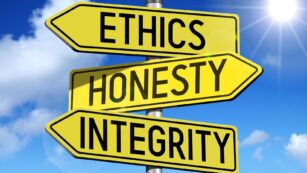
In today’s business world, trust and integrity are at the forefront of corporate success. A well-defined Code of Business Conduct and Ethics is not just a formal document; it’s a fundamental framework that guides the ethical operations of a company. This code helps organizations navigate complex legal landscapes and fosters a culture of honesty and accountability, ensuring that all employees adhere to high ethical standards.
Code of Business Conduct and Ethics
What Is a Code of Conduct?
 A Code of Conduct, commonly integrated as part of a broader Code of Business Conduct and Ethics, acts as a formal statement defining the ethical standards and expected behaviors within an organization. It delineates the principles that guide employee actions, ensuring consistency with the company’s core values. This document often addresses various aspects of professional conduct, including compliance with laws, conflict of interest policies, and confidentiality agreements. Moreover, it sets forth procedures for ethical decision-making and outlines repercussions for violations, underscoring its seriousness and the organization’s commitment to upholding it.
A Code of Conduct, commonly integrated as part of a broader Code of Business Conduct and Ethics, acts as a formal statement defining the ethical standards and expected behaviors within an organization. It delineates the principles that guide employee actions, ensuring consistency with the company’s core values. This document often addresses various aspects of professional conduct, including compliance with laws, conflict of interest policies, and confidentiality agreements. Moreover, it sets forth procedures for ethical decision-making and outlines repercussions for violations, underscoring its seriousness and the organization’s commitment to upholding it.
The Importance of Ethics in Business
The role of ethics in business cannot be overstated, as it influences every decision and interaction within the organization. Ethics serve as a compass that directs companies in navigating the complexities of modern business practices while maintaining integrity and transparency. Adopting a sound ethical framework helps organizations avoid legal issues, thereby protecting the company from damaging lawsuits and financial penalties. Furthermore, it fosters trust and loyalty among customers, enhances the company’s image, and attracts potential investors and employees who value ethical standards. Ultimately, a commitment to upholding high ethical standards drives long-term profitability and sustainability, positioning the company as a respected entity in its industry.
Key Elements of Effective Business Conduct Codes
Clarity and Accessibility
 Effective codes of business conduct and ethics are characterized by their clarity and accessibility. Companies ensure these documents are easily understandable, avoiding complex jargon that might obscure the message. These codes clearly define acceptable and unacceptable behaviors, providing employees with straightforward examples, such as guidelines on accepting gifts or handling confidential information. Additionally, accessibility is crucial; the code must be easily available to all employees, often published on the company’s intranet, distributed during training sessions, or included in employee handbooks. This transparency helps ensure that every team member, regardless of their position or department, understands the company’s ethical standards and expectations.
Effective codes of business conduct and ethics are characterized by their clarity and accessibility. Companies ensure these documents are easily understandable, avoiding complex jargon that might obscure the message. These codes clearly define acceptable and unacceptable behaviors, providing employees with straightforward examples, such as guidelines on accepting gifts or handling confidential information. Additionally, accessibility is crucial; the code must be easily available to all employees, often published on the company’s intranet, distributed during training sessions, or included in employee handbooks. This transparency helps ensure that every team member, regardless of their position or department, understands the company’s ethical standards and expectations.
Enforcement and Implementation Strategies
The effectiveness of a code of business conduct and ethics also hinges on robust enforcement and implementation strategies. Firms implement these codes through comprehensive training programs that educate employees about the details and importance of the code. Regular training sessions reinforce this knowledge and address new ethical issues as they arise. Enforcement is equally important, involving clear processes for reporting violations and mechanisms for handling breaches of the code. Companies often establish hot encompassing the full company organizational structure, audit committees, or ethics officers dedicated to maintaining compliance. This framework not only addresses violations swiftly and fairly but also upholds the integrity of the code, reinforcing the company’s commitment to ethical practices.
Case Studies: Companies with Exemplary Conduct Codes
 Recognizing companies with exemplary conduct codes underscores the practical application of a robust Code of Business Conduct and Ethics. Companies such as Google, Johnson & Johnson, and Patagonia set benchmarks in ethical practices and protocols.
Recognizing companies with exemplary conduct codes underscores the practical application of a robust Code of Business Conduct and Ethics. Companies such as Google, Johnson & Johnson, and Patagonia set benchmarks in ethical practices and protocols.
Google, for instance, operates under the motto “Do the right thing” — a reflection of its commitment to high ethical standards across global operations. It continually updates its conduct code to address emerging ethical challenges, facilitating transparency and accountability.
Strategies for Developing a Robust Code of Ethics
Adopting a robust Code of Business Conduct and Ethics isn’t just about setting rules; it’s about fostering a culture that enhances compliance and ethical standards at every level of the organization. Companies like Google, Johnson & Johnson, and Patagonia serve as beacons in this regard, illustrating the profound impact of integrating transparency, accountability, and stakeholder engagement into their core operational ethos. For businesses aiming to forge a path of integrity and trust, these examples offer valuable lessons on the importance of not just drafting a code of ethics but also living by it every day. This commitment is crucial for maintaining public trust and securing a place at the forefront of industry leadership.


